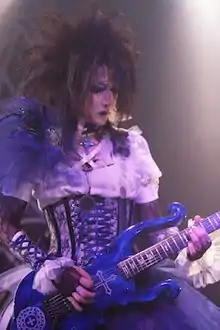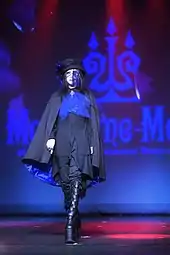Mana (Japanese musician)
Mana (Japanese: 魔名) is a Japanese musician, songwriter, record producer, and fashion designer,[1] best known as guitarist of the visual kei rock band Malice Mizer from 1992 to 2001. A year after they went on indefinite hiatus, Mana formed his solo project, the gothic metal band Moi dix Mois. His clothing label, Moi-même-Moitié, helped popularize the Gothic Lolita fashion movement.[2]
Mana | |
|---|---|
 Mana performing with Moi dix Mois in 2011 | |
| Background information | |
| Also known as | Serina |
| Born | March 19 Hiroshima, Japan |
| Genres | |
| Occupation(s) |
|
| Instruments |
|
| Years active | 1986–present |
| Labels | |
| Associated acts | |
| Website | Monologue†Garden 独白の庭 |
Early life
Mana's real name is not known publicly. His stage name, sometimes written with the kanji 魔名, reads "evil name" or "devil's name". His fans refer to him as Mana-sama.[3][4]
Mana was born on March 19 in Hiroshima. At an early age, he was introduced to classical music by his parents, who were both music teachers.[3] Mana started making music when he was in high school, inspired by Mötley Crüe, and he learned to play the drums because of Tommy Lee. As a teen he had an aversion to all things "girly" and he described himself as a "macho" with a destructive attitude.[3][4]
Career
Mana's first known band was the underground Ves.tearge in 1986. He later joined the punk rock group Girl'e, which was active from 1988 until 1990. He was known in both Ves.tearge and Girl'e by the stage name Serina,[3] and was also a guitarist for both bands as well. Mana then played bass for Matenrou (摩天楼, "Skyscraper"),[3] which was active from 1990 until 1992. After leaving them in April 1992, Mana and Matenrou guitarist Közi founded Malice Mizer[3] in August. Mana was the band's lead guitarist, chief songwriter, choreographer and overall artistic director.[4] He also founded his own indie music label, Midi:Nette,[3] on which most of Malice Mizer's work was released.[5] After Malice Mizer went on an indefinite hiatus in 2001,[3] Mana founded his solo project, Moi dix Mois in 2002.[3] He composes all of the music, writes the lyrics, produces, directs and designs the members' stage costumes.
In 1999, Mana created his own clothing label, Moi-même-Moitié,[6] which features two lines of designs named "Elegant Gothic Lolita" and "Elegant Gothic Aristocrat". He regularly appears in the scene's top publication, the Gothic & Lolita Bible, modeling his own designs and giving updates on his various other projects.[2][7] He is recognized internationally for his fashion endeavors; in 2007, British author Philomena Keet included him as one of seven designers in her Tokyo Look Book.[7] Several other books dealing with Japanese fashion and culture have featured him, like Style Deficit Disorder.[8] Moi-même-Moitié clothes and apparel were also sold in boutiques in Paris and the Netherlands, as well.[7] As of October 2019, its collection is sold exclusively online.[9]
In 2002, Mana signed the electronic visual kei duo Schwarz Stein to Midi:Nette and went on to produce for them. Despite their growing success, Schwarz Stein disbanded in March 2004,[10] and Mana has since been looking for new bands to sign and produce.
In 2004, Mana started to branch out internationally by opening his fan club to overseas members (a rarity amongst Japanese musicians) and setting up international distribution channels for his music and fashion. He played his first concerts with Moi dix Mois outside Japan in March 2005 in Munich, Germany and Paris, France.[11] During which he was interviewed and featured on the cover of European music magazines, such as the German goth magazine Orkus.[12]
At the end of 2007 Moi dix Mois returned to Europe, performing in France (a DVD of the concert was released on January 30, 2008) and Germany, Finland, Sweden, Spain and Italy.
In 2012, Moi dix Mois announced their first Latin America tour titled Tetsugaku no kakera - Chapter Six ~ Latin América Tour.[13] The band planned to visit Brasil, Chile, Argentina and Mexico. Later, the tour was canceled.[14]
Mana has also produced solo vocalist and cellist Kanon Wakeshima, who debuted in May 2008 on Sony Defstar Records.[15]
Musical style
Mana's composing style is very feeling-oriented. He refuses to learn music theory as he wants to create melodies and harmonies unlike other bands and finds regular song progressions dull. He composed based on the story he first creates, choosing the sound suitable for the story, using mainly guitar and keyboard. He believes in a natural flow of composing, and thus "his compositions often change rhythm or key, have multiple melodies and are generally unpredictable".[4]
Public image

Since the days of Malice Mizer, Mana rarely speaks in public. Although it was not a conscious decision at the beginning, he did latch onto the idea when the band's direction became apparent.[16] He speaks normally in printed interviews, but in his filmed interviews he whispers into the ear of a band member or confidante, who then relates his words back to the interviewer.[17] He has also been known to simply look at the camera as subtitles appear, as well as using Yes/No cards and expressing himself in mime or through musical instruments.[4]
He has, however, spoken on a few occasions. In a 1996 Malice Mizer interview on the TV show Hot Wave, he quietly replied with his name and his position in the band when introduced. But throughout the rest of the interview, Mana whispered in Gackt's ear.[18] He has also offered his vocals to the song, "Kyomu no Naka de no Yuugi", though his voice was heavily distorted.
Mana is known for wearing female clothes. Mana himself has said that he wanted to be the ultimate onnagata.[16] English-language Japanese music website JaME said he started discovering his "feminine side" before Malice Mizer.[4] His lack of speaking, combined with his commitment to feminine dress, led to people believing he was actually female.[16] Japanese music website Barks stated that after Mana and Malice Mizer, the number of visual kei bands with onnagata members increased.[16] Since the start of Moi dix Mois, Mana has dressed more androgynist.
Band history
- Ves.tearge – drums (high school) (1986–1987)
- Girl'e – guitar, synthesizer as Serina (1988–1990)
- Matenrou (摩天楼) – bass (1990–1992)
- Malice Mizer – guitar, synth guitar, keyboard, programming (1992–2001)
- Moi dix Mois – guitars, programming (2002–present)
Other appearances
- Art Marju Duchain – guitar (1994 Visual Art Collection Vol.1 ~喜劇的晚餐~ – 1996.11.08 "Visual Art Collection" ~喜劇的晚餐~, Shibuya O-West)
- Mana's Not Dead – drums ("Dis Inferno Vol. V" at Shibuya O-East on 2007.12.26, Visual-Kei DVD Magazine Vol. 2)
See also
References
- Godoy, Tiffany; Vartanian, Ivan (2007-12-01). Style deficit disorder: Harajuku street fashion, Tokyo. Chronicle Books. pp. 152–. ISBN 978-0-8118-5796-3. Retrieved 18 June 2011.
- "MOI-MÊME-MOITIÉ: HISTORY OF MANA'S GOTHIC LOLITA BRAND". jrocknews. 2018-06-13. Retrieved 2019-10-22.
- "MANA: HISTORY OF THE PIONEERING GOTHIC LOLITA GUITARIST". jrocknews. 2018-06-14. Retrieved 2019-10-22.
- "Biography Special: Mana (Part 1 – Self-Discovery)". Jame World. 2010-11-10. Retrieved 2012-10-22.
- "Malice Mizer Discography (Midi:Nette)" (in Japanese). malice-mizer-co-jp. Retrieved 2019-10-22.
- "Mana (MALICE MIZER / Moi dix Mois)、オンラインサロン開設". Barks (in Japanese). 2019-03-18. Retrieved 2021-01-02.
- "Biography Special: Mana (Part 2 - Beauty and Darkness)". Jame World. 2010-11-17. Retrieved 2019-10-22.
- Tiffany Godoy (2007). Style Deficit Disorder: Harajuku Street Fashion - Tokyo. Chronicle Book. ISBN 9780811857963.
- "MOI-MÊME-MOITIÉ 2018 PRODUCT SHOWCASE". jrocknews. 2018-06-17. Retrieved 2019-10-22.
- "Schwarz Stein". jpopasia.com. Retrieved 2019-10-22.
- "Japan's MOI DIX MOIS Schedule U.S. Tour Dates". blabbermouth.net. 2006-05-31. Retrieved 2019-10-22.
- "Moi dix Mois (Titelstory)" (in German). Orkus. Retrieved 2019-10-22.
- "Moi dix Mois to Tour South America | JaME U.S.A". Jame-world.com. 2012-07-26. Retrieved 2015-06-13.
- "Moi dix Mois cancela su gira por Latinoamérica" (in Spanish). Jame World. 2012-11-22. Retrieved 2019-10-22.
- "Kanon Wakeshima". Sony Music. Retrieved 2019-10-22.
- "【インタビュー】Mana × Közi、MALICE MIZERを語る「Kamiの約束が実現できる」". Barks (in Japanese). 2018-08-29. Retrieved 2021-01-02.
- "MANA-SAMA SPEAKS, SORT OF: AN INTERVIEW WITH THE ECCENTRIC VISUAL KEI STAR". LA Weekly. 2009-07-02. Retrieved 2019-10-22.
- "Malice Mizer on HOTWAVE 1996 (Mana talks!)". YouTube. Retrieved 2019-10-22.